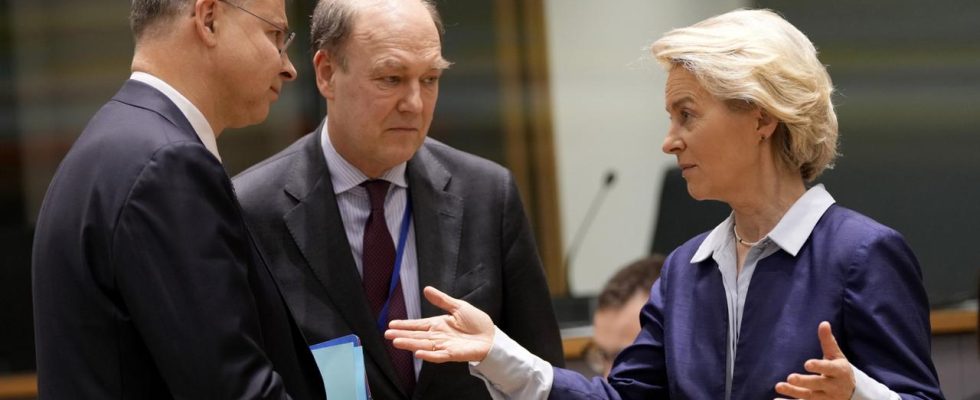The EU wants to indirectly use frozen Russian assets to help Ukraine. The interest income is intended to finance weapons, ammunition and equipment. The step was controversial – experts believe it is overdue.
The idea sounds obvious: the aggressor Russia should pay for the consequences of the war in Ukraine. But implementation is legally difficult and politically sensitive. Member states and the EU Commission have been discussing this for more than a year. Brussels is now proposing to seize interest income from Russian state assets frozen in the EU.
In total, around 210 billion euros in assets of the Russian central bank are on ice in the EU. The majority of the money is deposited with the Belgian financial institution Euroclear. According to the EU, the depository will earn up to three billion euros in interest this year after deducting Belgian taxes.
The Commission wants to capture almost all of this income – minus three percent, which Euroclear retains as a processing fee. In addition, the depositary may temporarily withhold a further ten percent as security, for example to cover court costs. But the majority, i.e. 87 percent, of the interest income should benefit Ukraine. As a first step, the EU banned depository institutions such as Euroclear in mid-February from continuing to dispose of interest profits from Russian central bank assets or from distributing these earnings to their shareholders.
Money for Ukrainian weapons
Almost all of the interest income – 90 percent – will flow into a fund outside the EU budget that will finance weapons, ammunition and equipment for Ukraine. A smaller part will be used to rebuild the country. If the member states unanimously give the green light, payments could flow to Ukraine twice a year. According to the commission, the first transfer could take place as early as July.
The Russian assets seized in the EU remain Moscow’s property. But the Kremlin can’t get it to pay for the war of aggression in Ukraine. For legal reasons, the EU cannot simply confiscate these assets and transfer them to Ukraine. You could invest it and reap the profits. However, this would also mean that the EU would be liable for possible losses.
From an EU perspective, the situation is different with the interest income on the frozen money: Brussels is convinced that these are unexpected income and are therefore the property of the depository institutions, to which Russia’s central bank and the Russian state have no claim.
The Kremlin sees it differently. A spokesman in Moscow warned that those responsible in the EU would face criminal prosecution.
Long legal concerns
The EU Commission and member states have been working for over a year on proposals to use Russian assets to benefit Ukraine. Last February, the Swedish EU Council Presidency set up a working group on this. Commission head Ursula von der Leyen announced a corresponding initiative for last summer. Because many EU governments are demanding that the aggressor pay, Eastern European and Baltic states are doing this particularly emphatically.
But large member states in particular expressed concerns, including Germany. The European Central Bank (ECB) warned that international investors could pull out of Europe if the EU accesses windfall profits from custodians of Russian assets. With regard to the current Commission proposal, a responsible official explains that his authority had discussed this in advance with the ECB and the member states.
Experts believe this step is justified
The Brussels think tank Bruegel believes the Commission’s proposal is a viable way to access the depositary’s profits without violating its obligations to its shareholders. Bruegel expert Nicolas Véron explains that this makes a lot of sense and is the right approach under the circumstances. He considers Brussels’ actions to be quite unusual, but justified by the special circumstances of the war in Ukraine.
From Véron’s point of view, a levy on interest income – unlike possible access to the frozen Russian assets – is appropriate. However, the expert is convinced that the step could have come earlier.
Helga Schmidt, ARD Brussels, tagesschau, March 20, 2024 3:00 p.m

